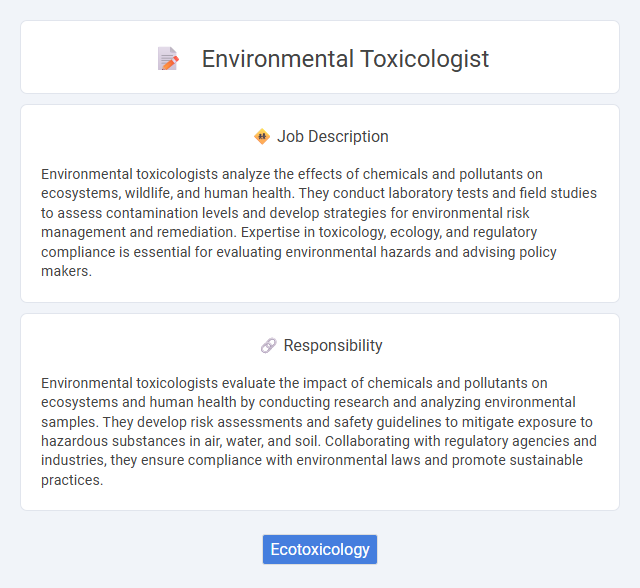
Environmental toxicologists analyze the effects of chemicals and pollutants on ecosystems, wildlife, and human health. They conduct laboratory tests and field studies to assess contamination levels and develop strategies for environmental risk management and remediation. Expertise in toxicology, ecology, and regulatory compliance is essential for evaluating environmental hazards and advising policy makers.
Individuals with strong analytical skills and a passion for environmental science will likely find a career as an Environmental Toxicologist suitable, as it involves assessing the impact of chemicals on ecosystems and human health. Those comfortable working in laboratory settings or conducting field research may adapt well to the job's demands. A tendency towards detail-oriented work and a concern for public safety could increase the probability of success and job satisfaction in this role.
Qualification
Environmental toxicologists typically require a minimum of a bachelor's degree in environmental science, toxicology, chemistry, or biology, with a strong emphasis on courses related to chemical exposure and ecological impact. Advanced degrees such as a master's or PhD are often preferred for research roles and positions involving complex data analysis or regulatory compliance. Professional certifications like the American Board of Toxicology (DABT) credential enhance credibility and job prospects in this specialized field.
Responsibility
Environmental toxicologists evaluate the impact of chemicals and pollutants on ecosystems and human health by conducting research and analyzing environmental samples. They develop risk assessments and safety guidelines to mitigate exposure to hazardous substances in air, water, and soil. Collaborating with regulatory agencies and industries, they ensure compliance with environmental laws and promote sustainable practices.
Benefit
Environmental toxicologists are likely to benefit from contributing to public health by assessing and mitigating the effects of pollutants on ecosystems and human populations. Their expertise tends to support regulatory agencies and industries in developing safer chemical practices and environmental policies, potentially leading to improved sustainability. Career opportunities may expand as global awareness of environmental issues increases, possibly enhancing job security and professional growth.
Challenge
Facing the challenge of assessing complex chemical interactions in diverse ecosystems, environmental toxicologists likely encounter uncertainty in predicting long-term ecological and human health impacts. The need to balance scientific rigor with regulatory requirements may pose difficulties in interpreting data and advising policy effectively. Managing evolving environmental contaminants and emerging pollutants probably requires continuous adaptation and innovative problem-solving skills.
Career Advancement
Environmental toxicologists can advance their careers by specializing in risk assessment, regulatory affairs, or research and development within toxicology. Gaining expertise in data analysis, environmental regulations, and emerging contaminants enhances opportunities for leadership roles in governmental agencies, consulting firms, or pharmaceutical companies. Pursuing advanced degrees or certifications in toxicology or environmental science significantly increases prospects for senior scientist or managerial positions.
Key Terms
Ecotoxicology
Environmental toxicologists specializing in ecotoxicology study the effects of pollutants on ecosystems and aquatic life, assessing chemical contaminants like heavy metals, pesticides, and industrial waste. They utilize bioassays, sediment analysis, and water quality testing to evaluate toxic impacts on flora and fauna, helping to develop environmental regulations and remediation strategies. Their work supports the preservation of biodiversity and ensures safe habitats by identifying harmful substance thresholds and monitoring pollution sources.
 kuljobs.com
kuljobs.com